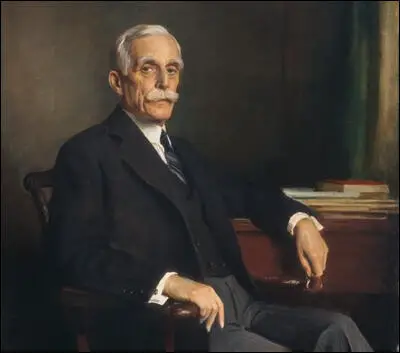Andrew Mellon

Andrew Mellon, the son of the banker, Thomas Mellon, was born in Pittsburgh on 24th March 1855. When he took control of his father's banking house he invested in growth industries such as coke, coal and iron.
Mellon helped establish the Aluminum Company off America, the Gulf Oil Corporation (1895), the Union Trust Company (1898) and the Pittsburgh Coal Company (1899).
A member of the Republican Party, Mellon served as secretary of the treasury under presidents, Warren Harding, Calvin Coolidge and Herbert Hoover. During his period in office (1921-32), Mellon followed policies that involved cutting income tax rates and reducing public spending.
Mellon also brought an end to the excess profits tax. Mellon's policies created a great deal of controversy and he was accused of following policies that favoured the wealthy.

The Great Depression was partly blamed on Mellon's policies and contributed to the defeat of Herbert Hoover in 1932. Mellon lost in post as secretary of the treasury with the election of Franklin D. Roosevelt in 1932.
Andrew Mellon, who established the Mellon Institute for Industrial Research and endowed the National Gallery of Art, died on 26th August 1937.
Primary Sources
(1) Andrew Mellon, Taxation: the People's Business (1924)
The problem of the government is to fix rates which will bring in a maximum amount of revenue to the Treasury and at the same time bear not too heavily on the taxpayer or on business enterprises. A sound tax policy must take into consideration three factors. It must produce sufficient revenue for the government; it must lessen, so far as possible, the burden of taxation on those least able to bear it; and it must also remove those influences which might retard the continued steady development of business and industry on which, in the last analysis, so much of our prosperity depends.
Furthermore, a permanent tax system should be designed, not merely for one or two years nor for the effect it may have on any given class of taxpayers but should be worked out with regard to conditions over a long period and with a view to its ultimate effect on the prosperity of the country as a whole. These are the principles on which the Treasury's tax policy is based, and any revision of taxes which ignores these fundamental principles will prove merely a makeshift and must eventually be replaced by a system based on economic rather than political considerations.
There is no reason why the question of taxation should not be approached from a nonpartisan and business viewpoint. In recent years, in any discussion of tax revision, the question which has caused most controversy is the proposed reduction of the surtaxes. Yet recommendations for such reductions have not been confined to either Republican or Democratic administrations. My own recommendations on this subject were in line with similar ones made by Secretaries Houston and Glass, both of whom served under a Democratic President. Tax revision should never be made the football either of partisan or class politics but should be worked out by those who have made a careful study of the subject in its larger aspects and are prepared to recommend the course which, in the end, will prove for the country's best interest.
I have never viewed taxation as a means of rewarding one class of taxpayers or punishing another. If such a point of view ever controls our public policy, the traditions of freedom, justice, and equality of opportunity, which are the distinguishing characteristics of our American civilization, will have disappeared and in their place we shall have class legislation with all its attendant evils. The man who seeks to perpetuate prejudice and class hatred is doing America an ill service. In attempting to promote or to defeat legislation by arraying one class of taxpayers against another, he shows a complete misconception of those principles of equality on which the country was founded. Any man of energy and initiative in this country can get what he wants out of life. But when that initiative is crippled by legislation or by a tax system which denies him the right to receive a reasonable share of his earnings, then he will no longer exert himself and the country will be deprived of the energy on which its continued greatness depends.
This condition has already begun to make itself felt as a result of the present unsound basis of taxation. The existing tax system is an inheritance from the war. During that time the highest taxes ever levied by any country were borne uncomplainingly by the American people for the purpose of defraying the unusual and ever increasing expenses incident to the successful conduct of a great war. Normal tax rates were increased, and a system of surtaxes was evolved in order to make the man of large income pay more proportionately than the smaller taxpayer. If he had twice as much income, he paid not twice but three or four times as much tax. For a short time the surtaxes yielded a large revenue.
But since the close of the war people have come to look upon them as a business expense and have treated them accordingly by avoiding payment as much as possible. The history of taxation shows that taxes which are inherently excessive are not paid. The high rates inevitably put pressure upon the taxpayer to withdraw his capital from productive business and invest it in tax-exempt securities or to find other lawful methods of avoiding the realization of taxable income. The result is that the sources of taxation are drying up; wealth is failing to carry its share of the tax burden; and
capital is being diverted into channels which yield neither revenue to the government nor profit to the people.
(2) George Norris, statement on the financial policies of Andrew Mellon (December, 1925)
The revenue bill as passed in the House is indefensible. In a nutshell it is a millionaires' bill. Practically all the reductions made are on the taxes of the incomes of those who are immensely wealthy Mr. Mellon himself gets a larger personal reduction than the aggregate of practically all the taxpayers in the state of Nebraska. The reduction of inheritance taxes on big fortunes contained in this bill is a greater step backward than has been taken by Congress since the war. It was passed by the House without fair consideration, without reasonable opportunity for debate, and is a demonstration of the working of the new rules just adopted by that body, enabling a few men who are alleged leaders to dominate the House and handle it as completely as the master controls his servant.
(3) Gerald Nye, speech in Congress (May, 1926)
The Mellon tax revision legislation provides great reductions in taxes to those who can best afford to pay taxes and causes the masses of the people to pay a greater proportion of the whole tax to be collected than was the case under the old bill... Favors have been granted by Congress to the railroads, the bankers, and great industries time and again. Congress considers what it has done for them 'good business'; but when the same measure of aid is asked for the farmer, it immediately becomes paternalism and class legislation.

